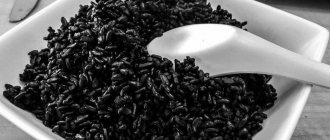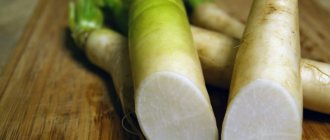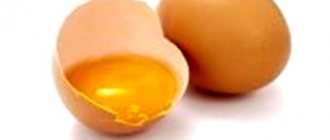Botanical characteristics
Rosemary is an evergreen small shrub; its height does not exceed one meter, but it can grow quite widely. In the warm season, the aroma of this plant is felt from afar.
If desired, rosemary can also be grown at home: it feels good in a spacious pot and will decorate any room or office.
Read more about how to grow this plant in our article.
Its leaves are a bit like spruce needles, but they are very soft and fragrant. The flowers of the shrub are small and collected in inflorescences. They come in blue, light purple or white.
Rosemary has been known to man since ancient times. For hundreds of years it has been used as a healing agent and for the production of essential oil.
This plant has several varieties, but the most common is ordinary rosemary. It is this plant that is most often planted in garden plots and used in cooking.
Harm and contraindications
Excessive consumption of any product, even the most useful, is fraught with complications.
- Large doses of spice can cause an allergy to the product.
- An overdose can cause vomiting, intestinal cramps, coma, and even the appearance of fluid in the lungs.
- Excessive use of spices can lead not only to a reduction in sperm count. Their density and mobility decrease, which can negatively affect fertility, that is, a person may lose the ability to reproduce viable offspring.
- If a person uses rosemary aimlessly, the result of this use of the spicy plant may be an itchy scalp, dermatitis or redness of the skin.
- The plant and products made from it are contraindicated in large quantities for women during pregnancy and those who are planning to become pregnant.
- Rosemary's ability to affect blood glucose levels makes it dangerous in large doses for diabetics and those with high blood sugar levels.
Rosemary requires careful attention and compliance with the standards for its use as a spice in food and as a cosmetic and medicinal product.
Benefits for the body
The beneficial effects of rosemary on the human body have long been no secret. It is regularly used for:
- protecting the walls of blood vessels;
- accelerating the healing of wounds and abrasions;
- increasing immunity;
- fight against fungi and staphylococcus;
- normalization of the cardiovascular system;
- improving blood circulation;
- relief of pain in muscles and joints;
- speed up digestion;
- improving performance;
- relieving stress and overexertion;
- improving the condition of skin and hair;
- getting rid of dandruff.
Benefits for women
Rosemary is often used in the treatment of gynecological problems. Thanks to it, women can regulate their menstrual cycle and also get rid of menstrual pain.
The plant provides invaluable assistance to the fairer sex during menopause: it normalizes hormonal levels and psychological state.
Essential oil is often added to medicinal baths and douches to relieve inflammation.
Benefits for men
Representatives of the stronger sex, thanks to regular and correct use of the plant, can increase potency and reduce the risk of developing prostatitis. In the East, this spice is considered an aphrodisiac.
Attention! Rosemary is not a medicinal product. And before starting treatment, I strongly recommend consulting with your doctor.
Benefits for cancer
This, of course, does not mean that rosemary can defeat cancer. However, many studies show that its use, coupled with full-fledged drug treatment, can delay tumor growth and promote the death of cancer cells.
Benefits for diets
Naturally, rosemary alone is not enough to lose weight. In the end, it’s just a bush, and you can’t cook a full meal from it. However, this does not mean that it should be discounted, because it helps speed up metabolism and reduces the amount of bad cholesterol in the blood. Therefore, rosemary can rightfully be considered a worthy component of any dietary menu. For example, experts recommend brewing its leaves as tea and drinking it a couple of times a day.
What are the benefits of rosemary?
The benefits and harms of rosemary to the body have been studied and are available for review. The properties of the product are aimed at detecting a problem in the body, preventing or destroying it. Actively used for medicinal and cosmetic purposes, it is capable of:
- protect the cell membrane from adverse factors;
- accelerate the regeneration of damaged tissues;
- strengthen the immune system;
- resist infectious and viral diseases;
- destroy the fungus, effectively combat staphylococcus;
- stimulate the heart;
- improve blood circulation;
- relieve muscle and joint pain, spasms;
- provoke the production and timely outflow of bile.
- facilitate the digestion process;
- break down gallstones;
- help improve intestinal motility;
- restore memory, increase performance;
- curb emotionality, get rid of sudden mood swings;
- reduce mental fatigue;
- have a positive effect on the functioning of the nervous system;
- accelerate hair growth, eliminate dandruff formation;
- cleanse the skin, eliminate signs of aging.
Important! In the Middle Ages it was used as an effective remedy against the plague.
The healing properties of rosemary for women
The benefits of rosemary for women are manifested in its ability to eliminate menstrual irregularities, relieve pain, and excessive bleeding. Almost indispensable during menopause, when the body experiences severe stress, which negatively affects physical and psychological health.
Many experts suggest using it to normalize hormonal levels, since it has the beneficial property of having a sedative effect, calming the nervous system, without causing harm to the body, unlike most medications.
The benefits and harms of rosemary oil are well known to gynecologists, so baths and douching are often used for inflammation of the female genital organs.
Benefits of rosemary for men
Men will appreciate the beneficial properties of the product, as it can have a positive effect on their body. A tincture of fresh leaves of the plant can enhance potency and eliminate the possibility of developing prostatitis. The benefits of the product are also used for preparing baths for inflammatory processes and purulent wounds on the genitals without harm to health.
We recommend reading: Carrot tops: benefits and harms, beneficial properties, contraindications
How to use
Rosemary is often found in recipes that traditional medicine offers us. In order not to harm yourself with such self-medication, you need to thoroughly study the healing properties of the bush, understand for what ailments it can be taken, and also study possible contraindications.
Decoction
If you suffer from stomach pain, poor digestion and stress, a decoction of the leaves of this shrub may help. It's very easy to prepare.
You will need:
- two tablespoons of dry crushed leaves;
- 250 ml boiling water.
The leaves need to be boiled for half an hour, then filtered. The resulting decoction should be drunk one teaspoon before meals.
Infusion
For heart problems, along with conventional medications, an infusion of this plant is used, which is also useful for relieving nervous tension.
You will need:
- one tablespoon of dried plant leaves;
- one glass of boiling water.
The leaves need to be poured with hot water and left for one hour. Then it is enough to strain the resulting product and drink it several times during the day.
To enhance the relaxing effect, you can add a little lavender to the infusion.
Inhalation
Rosemary helps cope with colds that plague us during the changing seasons. If you have a runny nose or sore throat, you can do inhalations using essential oil - just add 2 drops to hot water and breathe in the warm steam.
For greater effectiveness, you can add a couple of drops of thyme oil to the inhalation solution.
Medicinal tea
Tea with this plant helps strengthen the body’s natural immunity, which means it will be useful for almost everyone.
It is very simple to prepare: just pour 1 teaspoon of dried leaves of the plant with boiling water. The tea will steep for 10-15 minutes and will be ready to drink.
If desired, you can add other beneficial herbs to the drink - for example, lemon balm or mint.
Relaxing bath
If your job involves a lot of stress or you are going through a difficult period in your life, baths with rosemary infusion may help you. In this case, this completely natural remedy helps no worse than medications. Just pour a couple of tablespoons of dry leaves of the plant with hot water, and then add the filtered liquid to the bath.
Rosemary in cooking
Cooks everywhere use the spice rosemary, which has a lemon-sweet aroma and a sharp-bitter taste. Italian, Greek, and French cuisines, being the birthplace of this spice, use them in their numerous dishes. But chefs from the Middle and Near East also treat it with special adoration.
The use of this spice is not limited in any form. It is good in the form of both cut fresh branches and dry crushed leaves. Freshly picked twigs are more fragrant and richer in essential oils, which cannot be said about the dried product. True, it is more accessible at any time of the year, which cannot be said about the fresh plant.
In addition to the fact that the spice is used to prepare snacks, hot dishes, sweets, pickles and even drinks, nutritionists advise using just a pinch of the spice to speed up metabolism, as a result of which the water-fat balance is restored and the body is cleansed of toxins.
To give the dish a special aroma, you need to combine parsley, thyme, garlic, lemon, black pepper, chili pepper and marjoram with rosemary. But rosemary and bay leaf are not “friends” with each other.
Where is it added as a seasoning?
Not all people can appreciate the aroma of this spice the first time, but those who have tried it more than once do not change their passion. Considering another name for rosemary – “sea freshness”, we can say without a doubt that the spice in the form of a seasoning is suitable for fish and meat dishes. Rosemary sprigs added to the marinade muffle the specific odors of meat, characteristic, for example, of poultry or forest game. The fish will taste better if you add sprigs of the plant to it during baking.
Prolonged heat treatment of rosemary does not deprive it of its rich aroma. Soup, sauce, boiled and stewed meat will absorb its flavors regardless of the cooking time. Rosemary perfectly brings out the taste of cheese, so a sprig of rosemary added to pizza or cheese soup will add a special charm to the dish. Beans, peas, mushrooms and root vegetables pair well with these flavorful greens. Some pasta dishes also benefit from a rosemary herb seasoning.
Twigs of this Mediterranean shrub can be used to flavor vegetable oil. Salads are dressed with infused oil in which a small sprig of rosemary has been dipped. This is suitable for baked and stewed vegetables.
Important! Rosemary as a preservative is recommended for use in canning and fermentation, because it can prevent food spoilage.
The dosage of use of rosemary depends on its condition. The rich smell of fresh greenery of the bush suggests the use of no more than one small twig. The dried spice does not have a very pronounced smell, but, as culinary experts advise, one teaspoon of the spice will be quite enough for meat dishes and marinades.
Whatever a person’s attitude towards this spice, the norms for its use should be observed when preparing various dishes. This spice, suitable for meat and vegetable dishes, mushrooms, sauces, soups, cheese appetizers and pizza, should be added at the end of cooking, otherwise its bitterness will transfer into the food.
What can be replaced
Sometimes rosemary should be replaced with another spice due to its absence or due to an allergic reaction to it.
- Thyme is the first replacement for rosemary due not only to its external similarity, but also to its more delicate peppery aroma. It will be a good substitute for soups, stews, and cold dishes.
- Tarragon, instead of rosemary, is used only in dried form in meat and fish dishes, as well as dishes made from eggs and poultry. Tarragon is also often flavored in vinegar.
- Savory is a spicy herb more typical of Bulgarian cuisine. Pork and poultry dishes will not be worse if you use savory instead of rosemary.
- Sage is similar to rosemary in its equally intense aroma. There is little difference in substituting sage for rosemary in poultry, some seafood and meat dishes. Culinary experts advise mixing sage with butter or cheese to improve the taste of some dishes.
- The aroma of marjoram is similar to that of oregano and thyme, so it is a good substitute for rosemary in stews, sauces, soups and salads. By the way, unlike rosemary, it is not the plant itself that is used in cooking, but the seeds. A teaspoon of such seeds will enliven food and add zest to salads and fish dishes.
- The most common substitute for rosemary in cooking is bay leaf. Its aroma is lighter, so the range of its use in preparing a wide variety of dishes is even somewhat wider than that of its “brother”.
- Substitutes for rosemary can be oregano and basil, the availability of which in dried and fresh form is not limited.
The lack of spice is fully compensated by other spices that have similar properties and aromas.
Benefits of essential oil
The oil obtained from the plant has a long list of medicinal properties:
- helps cope with headaches and muscle pain;
- improves liver function;
- promotes digestion;
- brings blood pressure back to normal;
- improves the appearance of facial skin;
- stops hair loss;
- effectively fights fungal diseases.
You can learn more about using rosemary oil in our article.
Use of oil in home cosmetology
From the above beneficial properties of rosemary, it becomes clear that home cosmetology cannot do without this healing ingredient. Various facial creams, masks, lotions, and soap are made with it.
Face masks
By adding a couple of drops of rosemary essential oil to your regular mask, you can achieve firmer, healthier-looking skin.
Anti-acne remedy
This plant is often used in acne treatment products.
In order to get an effective spot remedy, just grind 1 teaspoon of black cumin and 2 drops of rosemary essential oil in a mortar. The resulting mixture should be applied to skin irritations and left for several hours or overnight.
Benefits for hair
Rosemary is often used in hair care products. Essential oil can help with hair loss - it is gently rubbed into the scalp.
- Mask for oily hair
In order to keep oily hair clean longer and also get rid of itching and dandruff, you need to take:
- jojoba oil – 1 tablespoon;
- grape oil – 2 tablespoons;
- rosemary essential oil – 2 drops.
Mix the ingredients thoroughly, apply gently to the scalp and distribute through the hair. Then wrap your head in a towel or wrap it in film. Wash off after half an hour with your regular shampoo.
Chemical composition
Rosemary leaves and shoots contain many beneficial components.
- Micro and macroelements: calcium, phosphorus, zinc, copper, magnesium, sodium, iron, cobalt, manganese.
- Vitamins: retinol, thiamine, pantothenic acid, pyridoxine, ergocalciferol.
- Caprylic acid – has an antibacterial effect, destroys most pathogens.
- Linoleic and linolenic acids are unsaturated fatty acids that are necessary for almost all metabolic reactions of metabolism.
- Palmitic and oleic acids help improve the appearance of the skin, maintain its tone, and are also responsible for good mood and well-being.
- Tryptophan and isoleucine are essential amino acids that are part of all body proteins and are precursors of serotonin and melatonin.
- Valine is responsible for the growth and development of tissues and organs, and is necessary for optimal nitrogen metabolism in the body.
- Threonine – supports adequate synthesis of collagen and elastin, ensuring a healthy, youthful appearance of the skin.
- Plant sterols are part of cell membranes and help get rid of excess cholesterol and its “bad” fractions.
Calorie content
100 grams of rosemary contain 131 kcal, of which 3.3 grams of protein, 5.9 grams of fat and 20.7 grams of carbohydrates.
Collection, storage and procurement
If you want to prepare the plant yourself, here are some recommendations:
- leaves can be collected throughout the summer, but it is better to choose the time before flowering begins;
- select the upper parts of the shoots, as they are younger and softer.
Cut off the required number of stems and place them on paper in a dry and ventilated area. Drying may take 2-3 weeks.
Separate dry leaves from the branches and put them in fabric bags. Dried rosemary can be stored for about two years.
You can find more information about the plant in the video.











